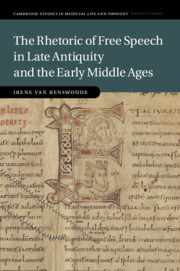Description
The Rhetoric of Free Speech in Late Antiquity and the Early Middle Ages
Cambridge Studies in Medieval Life and Thought: Fourth Series
Author: van Renswoude Irene
Analyses the rhetoric of dissidents, outsiders and truth-tellers to challenge preconceptions about free speech and political criticism in the early Middle Ages.
Language: English
Approximative price 30.28 €
In Print (Delivery period: 14 days).
Add to cart
The Rhetoric of Free Speech in Late Antiquity and the Early Middle Ages
Publication date: 06-2021
Support: Print on demand
Publication date: 06-2021
Support: Print on demand
Approximative price 107.80 €
In Print (Delivery period: 14 days).
Add to cart
The Rhetoric of Free Speech in Late Antiquity and the Early Middle Ages
Publication date: 09-2019
288 p. · 15.8x23.5 cm · Hardback
Publication date: 09-2019
288 p. · 15.8x23.5 cm · Hardback
Description
/li>Contents
/li>Biography
/li>
The early Middle Ages is not a period traditionally associated with free speech. It is still widely held that free speech declined towards the end of Antiquity, disappearing completely at the beginning of the Middle Ages, and only re-emerging in the Renaissance, when people finally learned to think and speak for themselves again. Challenging this tenacious image, Irene van Renswoude reveals that there was room for political criticism and dissent in this period, as long as critics employed the right rhetoric and adhered to scripted roles. This study of the rhetoric of free speech from c.200 to c.900 AD explores the cultural rules and rhetorical performances that shaped practices of delivering criticism from Antiquity to the Middle Ages, examining the rhetorical strategies of letters and narratives in the late antique and early medieval men, and a few women, who ventured to speak the truth to the powerful.
Introduction; Part I: 1. The steadfast martyr; 2. Hilary of Poitiers; 3. The detached philosopher; 4. Ambrose of Milan; 5. The silent ascetic; Part II: 6. The frank holy man; 7. Gregory of Tours; 8. The wise adviser; 9. Agobard of Lyon; 10. Pope Gregory; Epilogue.
Irene van Renswoude is Professor of Medieval Manuscripts and Cultural History at the Universiteit van Amsterdam, and researcher at Huygens Instituut voor Nederlandse Geschiedenis, a research institute of the Royal Netherlands Academy of Arts and Sciences. She was awarded the Heineken Young Scientist Award for History in 2014 for her research on free speech and censorship, and is a member of the editorial board of Medieval Worlds and the Journal for the History of Knowledge. She is the co-editor of several volumes, including Strategies of Writing: Studies on Texts and Trust in the Middle Ages (2008) and The Annotated Book in the Early Middle Ages (2018).
© 2024 LAVOISIER S.A.S.




